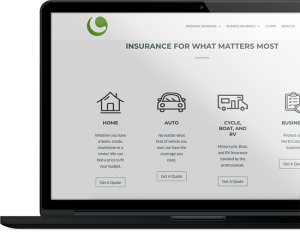

Here are six things that your insurance agency’s website should have in order to become a powerful lead-generation tool.
Unique, Mobile Responsive Design Customized to Your Agency’s Brand
Far too many insurance agencies use basic templates when creating a website. These templates all look the same, making it difficult for your insurance agency’s message to stand out. You’ll have difficulty building trust and generating leads if your website looks the same as everyone else’s website.
You’ll also experience difficulty if your website doesn’t display correctly on all devices. You need to use a mobile responsive design so that people can easily navigate the site and access the pages, regardless of the device they use. Don’t create separate websites for desktops and mobile devices, either. Provide the same seamless experience regardless of the device with a mobile responsive site.
Unique Content for Each of Your Insurance Products
In order to generate organic traffic from the search engines, your insurance agency’s website needs to contain high-quality content that’s unique to your agency. Your content is the foundation of your SEO strategy and is critical to your website’s success. Good content can help you drive more traffic, connect with your customers and prospects, and position yourself as an industry thought leader.
Optimize With SEO Best Practices in Mind
Search engines like Google analyze a number of different factors when determining the order to display websites. You can get your insurance agency website to the head of the pack with the right search engine optimization (SEO) strategy. The proper SEO strategies will allow you to get a prominent ranking in the search results to reach more potential clients.
Start with a round of keyword research to determine which phrases your prospects are searching for. You’ll use these keywords in your content and behind the scenes in your website’s meta data, URLs, and more.
Also, as we previously mentioned, search engines expect a website to have high-quality, unique content. If your content is copied from another source or doesn’t provide value, you won’t be able to compete organically. Ensure that your content is well optimized by incorporating your target keywords throughout the copy.
You can also help search engines better understand your content by using internal links. These links show search engines the relationship between the pages on your site and can make it easier for your visitors to find more of your content.
Finally, make sure the website loads quickly and is easy to navigate. Slow loading sites that are difficult to navigate typically end up near the bottom of the search results. You can test your website using Google’s PageSpeed Insights tool.
Includes the Best Local SEO Strategies
Local SEO is also critical for insurance agencies. The right local SEO strategy will show the search engines that you serve a specific market. When people search for things like “insurance agency near me” or “auto insurance in Omaha, Nebraska,” your insurance agency’s website will have a much better chance of showing up with the right strategy in place.
Schema markup should be a part of your local SEO strategy. Search engines analyze the microdata to understand location-based information, such as your agency’s address and phone number. This makes it easier for search engines to know when to display your website in local searches.
You need to utilize other local SEO strategies too, including creating and optimizing your Google My Business profile and attracting incoming links and citations. Gathering reviews from sites like Google and Yelp can help with your local SEO strategy. As a bonus, reviews also make it easier to build trust with your market.
Strong CTAs and Lead Generation Capabilities
A successful insurance agency website does an excellent job of generating leads. This begins with strong calls to action (CTAs) throughout the site. Use CTAs to compel people to take the desired action, such as filling out a form or calling your agency. You then need a way to collect the leads. Add a form that people can fill out to request quotes on your site. You should provide a form for each product you offer.
Also, consider including live chat on your website. A live chat feature allows people to ask and get answers to important questions. You can also use the tool to collect lead information that you can pass on to your insurance agents. Finally, live chat support is an essential tool for your current customers. They can visit your website to ask questions about their policies, as needed.
Analytics Tracking
Some insurance agencies build websites and then forget about them, never taking the time to analyze the data to determine what’s working and what isn’t.
Using something like Google Analytics, you’ll be able to see where your traffic comes from, which sources provide the best conversions, and what people do when they visit your insurance agency’s website. Analyzing this data will allow you to make informed decisions about your website and marketing campaigns.
Unless you are a professional web designer, building a website with these features can be challenging. Fortunately, you don’t have to do it yourself. Here at Jenesis Software, we specialize in web design for insurance agencies. Interested in learning more? Request a demo, today!

 Your website is the single most crucial aspect of your
Your website is the single most crucial aspect of your 